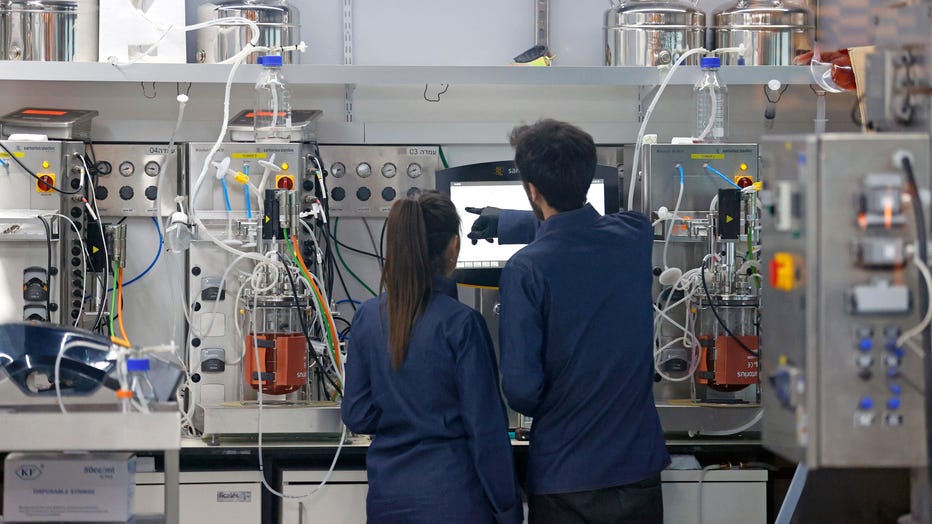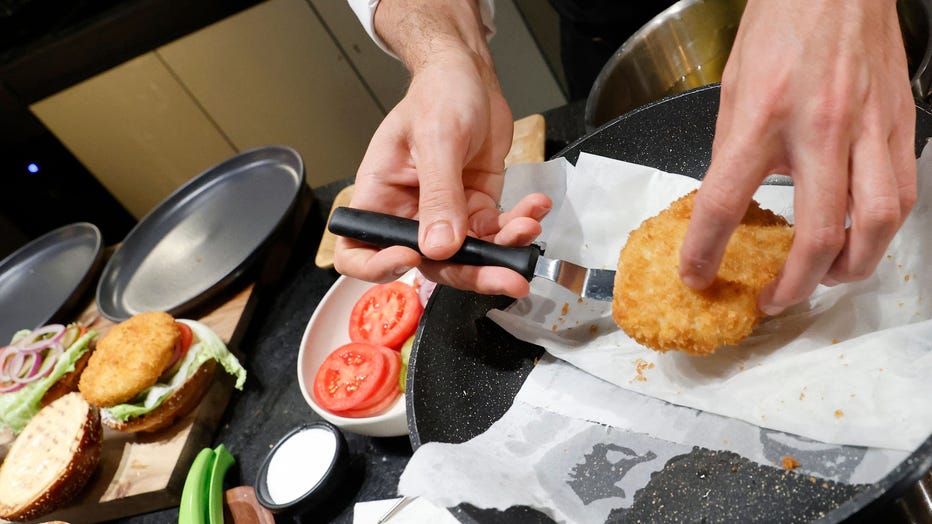Lab-grown meat is safe to eat, FDA says

Noodle bowl with UPSIDE Chicken (UPSIDE Foods)
The U.S. Food and Drug Administration says a lab-grown chicken product made from real animal cells is safe for people to eat.
It’s the first time the agency has consulted with a company on lab-grown or "cultured" meat, and experts say it will open up a new industry in the U.S. that doesn’t harm or kill animals.
According to the FDA, California-based UPSIDE Foods plans to take living cells from chickens and grow the cells in a controlled environment to make "cultured animal cell food."
"After our careful evaluation of the data and information shared by the firm, we have no further questions at this time about the firm’s safety conclusion," the FDA said, but the company still has to meet several other FDA requirements before its product can enter the market.
READ MORE: Panda Express, Beyond Meat bring back plant-based orange chicken to restaurants nationwide
"This is a watershed moment in the history of food," Dr. Uma Valeti, CEO and founder of UPSIDE Foods, said in a statement. "This milestone marks a major step towards a new era in meat production."
How is cultured meat made?

Technicians produce "cultured chicken" meat at the food-tech startup SuperMeat in the central Israeli town of Ness Ziona on June 18, 2021. (Photo by JACK GUEZ/AFP via Getty Images)
According to the FDA, the process for creating food from animal cells can be oversimplified into these four steps:
1. A sample of cells is taken from the tissue of an animal, which doesn’t harm or kill the animal. Some cells from the sample are selected, screened, and grown to make a "bank" of cells to store for later use.
2. From there, cells are taken from the cell bank and placed in a controlled environment that supports growth and cellular multiplication by supplying nutrients and other needs.
READ MORE: Vandals at Ohio farm release 10,000 carnivorous mink into wild, sheriff says
3. After the cells have multiplied into billions or trillions of cells, additional substances (like protein growth factors, new surfaces for cell attachment, additional nutrients) are added to enable the cells to assume characteristics of muscle, fat or connective tissue cells.
4. Once the cells have differentiated into the desired type, the cellular material can be harvested from the controlled environment and prepared using conventional food processing and packaging methods.
When will lab-grown meat be sold in the US?
Currently, the only country where you can legally buy cultured meat is Singapore, but with 151 cellular meat companies worldwide and $2.6 billion in investments, the race is on for the next country to approve the process.

Israeli chef Shachar Yogev prepares chicken burgers from "cultured chicken" meat at a restaurant adjacent to the SuperMeat production site in the central Israeli town of Ness Ziona on June 18, 2021. (Photo by JACK GUEZ/AFP via Getty Images)
Manufacturers say it’s more environmentally friendly because it uses less water and land than farm-raised meat, and "because it’s made in a controlled environment subject to high standards of testing for safety and quality control, it has the potential to help reduce the risk of harmful bacterial contamination."
Environmentalists have warned that the world’s growing appetite for meat isn’t sustainable because beef, pork and poultry require far greater resources than plant-based proteins. Cows in particular also produce large amounts of greenhouse gas that contribute to global warming.
READ MORE: Non-stick pans could be releasing millions of tiny plastic particles into your food, study finds
UPSIDE Foods, which also has produced cell-grown beef and duck, has attracted investments from food giants Cargill and Tyson Foods as well as billionaires Richard Branson and Bill Gates. Companies said they are working on ways to bring down the high costs associated with production.
READ MORE: McDonald’s pulls Beyond Meat ‘McPlant’ burgers after trial run
A report released in 2019 by consulting firm A.T. Kearney predicts that by 2040, cultured meat will make up 35 percent of meat consumed worldwide, while plant-based alternatives will compose 25 percent.
Still, cell-based meat companies face resistance from U.S. livestock producers, who have been lobbying states to restrict the "meat" label to food products derived from slaughtered animals and have been raising questions about the safety and cost of cultured meat.
The Associated Press contributed to this report.

